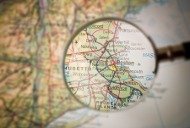The "Forest Law Enforcement, Governance and Trade" (FLEGT) Action Plan
The Forest Law Enforcement, Governance and Trade Action Plan, in short FLEGT, adopted in 2003 by the EU Commission, aims to prevent the import of illegal timber into the European Union and, with this, to contribute to the fight against illegal logging and more sustainable forestry in the timber exporting countries.
This Action Plan is based on the knowledge that illegal deforestation and international trade in timber resulting from this is a widely spread problem with massive negative consequences for people, the environment and the economy. According to estimates, in some countries, the share of illegal logging in deforestation constitutes around 90 per cent. Worldwide, about one billion people depend on healthy forests for their livelihoods. Forests also play an irreplaceable major role in the conservation of ecosystems in general (i.e. conservation of biodiversity, containment of global warming). Illegal logging is also responsible for the loss of private and state revenues. The World Bank estimates a loss in revenues through illegal logging amounting to US $10 to 15 billion per year. Timber is also a 'conflict resource', as revenues from the export of illegal timber are also used to finance armed conflicts. Deforestation is illegal when locally applicable laws at the logging area are breached.
The FLEGT Action Plan is one of a number of measures against illegal logging and forest law enforcement and governance (FLEG). According to estimates, about 40 per cent of the illegally traded timber are exported into G8 states. In 1998, as a reaction to this, they committed themselves to taking measures against illegal logging. The World Bank, in turn, has been supporting regional FLEG processes since 2001 in support of bi-and multilateral cooperation against violations of forestry laws. During the World Summit on Sustainable Development in Johannesburg in 2003, international consensus over the importance of the fight against illegal logging was confirmed. Some international conventions, such as the Convention on Biological Diversity (CBD), the new International Tropical Timber Agreement (ITTA, 2006) and the Washington Convention on International Trade in Endangered Species of Wild Fauna and Flora (CITES) are providing for FLEG activities. The forum "The Forest Dialogue” (TFD) that numerous international actors participate in and that takes place on a regular basis, as well as the United Nations Forum on Forests (adopted in 2007 as a non-legally binding instrument) are dedicated to fighting illegal logging.
Taking into account the G8 activities, the European Commission complemented existing initiatives with the FLEGT Action Plan by the aspect of trade (T in FLEGT), thus highlighting the joint responsibility of both exporting and importing countries for the fight against illegal logging. The Action Plan, an EU-FLEGT regulation that entered into force in 2005, as well as an implementing regulation of 2008 foresee two major instruments. On the one hand, an FLEGT license is to certify the clearance of the traded timber. On the other, voluntary partnership agreements (VPA) between the European Union and exporting countries’ governments are to create the preconditions for granting such FLEGT licenses, clarify the details for that and govern the import of legally logged timber. Countries that do not fulfil the legal minimum requirements laid down in the negotiation mandate for the VPAs can initially profit from support and assistance in establishing a legal reform.
Partnership agreements are negotiated by the EU Commission with support by the EU Member States. VPAs have already been concluded with Ghana, Cameroon, the Republic of the Congo (Brazzaville), Liberia, the Central African Republic and Indonesia. Negotiations are currently under way with with Laos, Thailand, Malaysia and Vietnam for example. First, EU financial support will aid the participating states to build the necessary capacities and institutions for enforcing forest law; then, after an agreed-upon period of time, only timber that has been certified as legal can be imported into the European Union. In concrete terms, participating states must have their entire production certified: From forestry and logging to processing and transport, or there must be other documentation certifying that the entire delivery chain is subject to controls and fulfils the respective standards. This certificate is then controlled by the responsible agencies of the respective Member State upon import into the European Union before the timber can be sold. In general, round and sawn timber, as well as veneer and plywood, are to be recorded; details are also laid down in the VPAs.
The FLEGT-license is only one of a number of other certification schemes for timber; the most well-known scheme in Europe is probably the Forest Stewardship Council (FSC) seal. Forestry businesses and processing companies that adhere to these certification schemes voluntarily commit themselves to keeping certain predetermined standards. The FLEGT process, however, is to firstly create the preconditions for enforcing binding legal standards which are then to be confirmed. The first FLEGT license received Indonesia in November 2016.
Despite the fact that the FLEGT process and other measures against illegal logging have been positive developments, implementation is extremely slow. Lacking transparency and regular control of the progress are some of the factors contributing to this. Regular reporting, for instance, is not necessarily required. In many timber-producing countries, weak governance, corruption and deficits in the rule of law prevail. Against this background and in the framework of development cooperation, exporting countries are supported not only in their forest policy but also with respect to good governance, the fight against corruption and in law enforcement. Environmental organizations however criticize gaps in the licensing regime. The regime, for instance, only refers to direct imports of partner countries and only to certain groups of products. In recent years, it has become noticeable that partner countries legalize illegal timber as it is not controlled whether timber that has been imported into the partner countries has been harvested legally. Third party countries, such as China, where illegal timber is processed into semi-finished or finished wood or paper products and then imported into the European Union, are also not covered. In consequence, direct exports from African round timber to Europe have declined, and imports from processed products from China have increased.
Germany has developed its own FLEGT strategy, which is part of the Sector Concept "Forest and sustainable development" of the Federal Ministry for Economic Cooperation and Development (BMZ) and in the framework of which FLEGT activities are supported in nearly 20 partner countries. Some of the 79 AKP states in Africa, the Caribbean and the Pacific region are also supported in their implementation of FLEGT activities by the four-year-long ACP-FLEGT Support Programme, implemented by the Food and Agriculture Organization (FAO) and financed by the EU Commission.
At present, it is still too early to come to a clear conclusion as regards the FLEGT process. What is clear, however, is that even in view of some positive developments in the framework of bilateral negotiations, the long-term goal of creating a multilateral body of regulations with a planned participation of other important countries outside of the EU (such as the United States, China and Japan) is still a long way off. Sustainable and lawful forestry can only be enforced when exporting countries, on the one hand, guarantee the legality of the timber and importing countries on the other insist on being presented with a license.With a unilateral step in this direction, the import of illegal timber on EU-level has since been prohibited. Since November 2010, companies that import wood products into the European Union have to prove that these do not originate from illegal logging, increasing the responsibility of importers.
Sources and further information:
- Official Journal of the European Union (2010) REGULATION (EU) No 995/2010 OF THE EUROPEAN PARLIAMENT AND OF THE COUNCIL of 20 October 2010 laying down the obligations of operators who place timber and timber products on the market
- Bundesministerium für wirtschaftliche Zusammenarbeit und Entwicklung. N.d. Ziele und Umsetzung von FLEGT-Maßnahmen im Rahmen der deutschen bilateralen Entwicklungszusammenarbeit. Bekämpfung des illegalen Holzeinschlags als Beitrag zur nachhaltigen Entwicklung. (German)
- European Forest Institute (2008): Forest Law Enforcement, Governance and Trade - European Union approach, EFI Policy Brief 2.
- Heinrich Böll Stiftung (Hrsg.) (2007): Haben und Nicht-Haben. Verantwortungsvolle Ressourcenpolitik im 21. Jahrhundert Berlin: HBS. (German)
- Pathfinder Conference 2010: Illegal Trade in Natural Resources: What can Brussels do?, Page 29-30.





